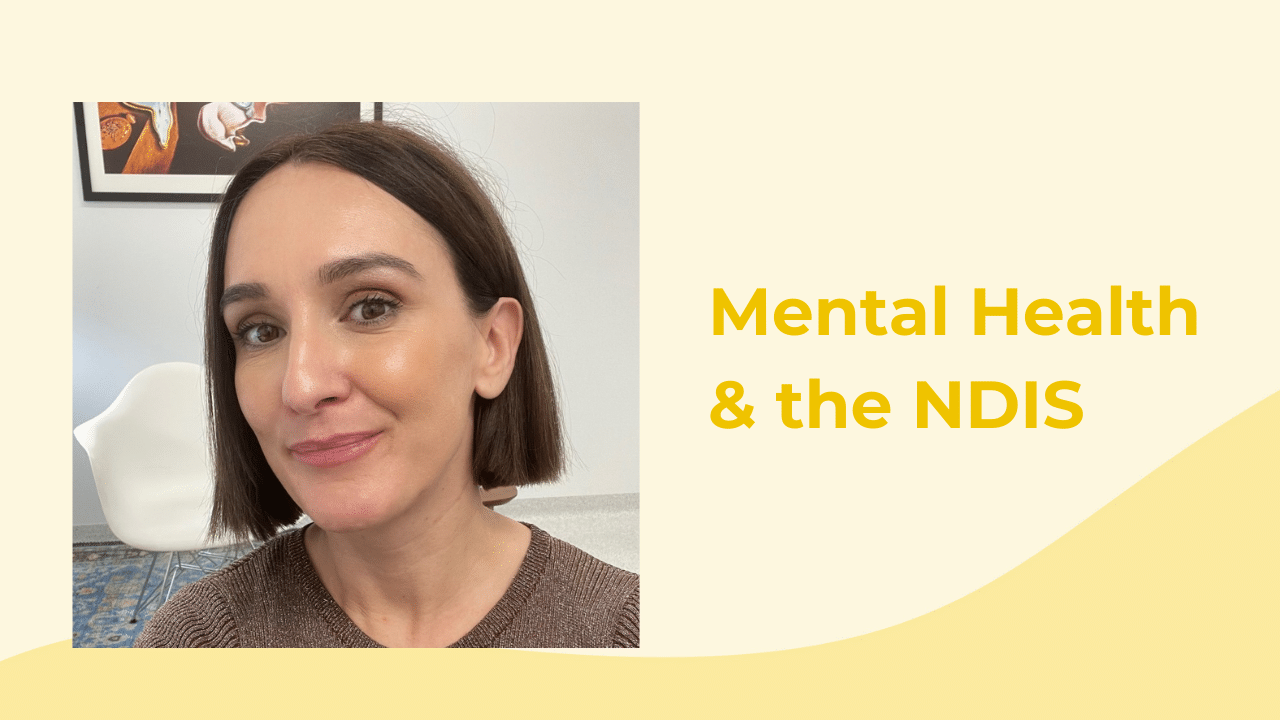32% of Australians living with a disability experience high psychological distress.
Anxiety, depression and stress are some of the most common mental health conditions that stop people living with disability from achieving their potential.
It's so important we prioritise our mental health. We chat with leading clinical psychologist and co-founder of MindAid, Dr Leah Pischek Simpson about how a psychologist can help an NDIS Participant achieve their goals.
How To Choose The Best Psychologist For You?
It may start with a GP giving you a referral or you having access under one of your NDIS budgets for psychological support.
You can go with a recommendation from a service or your GP, or you can find someone to suit your needs.
Every psychologist works differently. It depends on their interest area and treatment approach.
In my opinion, having a good therapeutic relationship with your therapist is part of the journey of getting well.
This means you have to like them, trust them, respect them and feel validated by them. If it does not work or feel right, there is nothing wrong with changing course after several sessions.
Different approaches work for different people, so it's important to ask what type of treatment your therapist would do.
Some clients like breathing and relaxation. Others like to be confronted about their internal worlds and conflicts. Some need specific skills training for lifestyle changes.
There are various types of Psychologists – general, clinical, forensic etc. These psychologists have different roles, based on different levels of training. It’s important to understand what you may need so you can find the right specialist.
For example, some services such as Centrelink will only accept a diagnosis from a Clinical Psychologist. You may need to be aware of some of these things depending on what you are trying to achieve.
It’s important to note, not every psychologist is familiar with the NDIS process and may only see patients under Medicare.
At the moment, due to the pandemic, it is very difficult to get into a Psychologist. I encourage people to pick a psychologist and make a booking understanding you may be waiting 3-5 months in some regions.
However, if things escalate and you need support ASAP, please see your GP regular or call Lifeline. It’s so important you do what you need to do in order to keep well.
What Coping Strategies Do You Recommend For Anyone Suffering Anxiety And Depression?
This really comes down to level of severity. How intense the symptoms are and how long they have been there.
There are general things we can do, such as encouraging lifestyle changes - exercise, diet, reducing alcohol, relaxation and self-care.
I'm very focused on working with people's emotions. What are they feeling?
Feeling's not a fact. A lot of people might say they're experiencing anxiety, but when you start peeling back the layers you might actually find they're actually really sad or they're really angry, or they're really disappointed.
In the world of emotions there's a lot that we can learn about that because most of the emotions that we experience as humans are unpleasant. There's only one that's pleasant, which is happiness.
The other emotions can be helpful and adaptive, but we have to really understand them and know what's going on for us.
If we ask people how do you feel? Most of us launch into, "Oh, I'm good. I'm feeling this, I'm doing this."
That's not really your feeling. That's a thought. An emotion is one word. I'm sad, I'm agitated. I'm confused. If you can pinpoint your emotion you're in a better position to tackle it.
Just labelling your emotions can be very healing because it allows us to work out what we're feeling. What's happening in our bodies. How are we reacting. How can we change course.
I'm a big fan of listening to your emotions but I must also point out there's a lot of room for psychiatry and medication.
Depending on what's going on for someone, some people may require additional help through a treating team if their symptoms are not remitting or intensifying across time.
What Role Does Exercise Have In Managing Anxiety?
Like all forms of therapy, the effect can vary. Some people may respond positively while others may find it doesn’t improve their mood much, and some may experience only a modest short-term benefit.
Exercise can :
- increase your energy levels
- help you get a good night's sleep
- distract you from your worries and get you out of a cycle of negative thoughts that can feed anxiety and depression
- help you get out and be with people if you're feeling lonely, even a smile as you pass someone on the street can boost your mood
- help you feel more in control, and improve your self-esteem, because you are taking an active role in your own treatment
- increase your confidence as you meet challenges and reach goals, no matter how small, as well as helping you to feel good about your body
- help you to avoid less helpful approaches, such as drinking alcohol or dwelling on how you feel.
How Can A Support Worker, Parent Or Guardian Help Someone Who Is Struggling With Anxiety Or Depression?
The number one thing I say to Support Workers and family members is listen. If we don't listen we don't know what people need.
- Listen to what they're saying. We can also ask what people need. People are quite good at telling you what they need if you actually ask them. If someone says I need help and you're offering to do something, let your yes mean yes and do what you say you're going to do to help them.
- Encourage action to take healthy steps. Whether that is through lifestyle changes, going to a GP or helping them to find a psychologist.
- Try not to solve problems for people. Sometimes people just need to vent.
- Don't make the conversation about you. We can share experiences, but the timing of that is critical.
- Try not to diagnose. Keep questions open-ended. For example, ask what's happening for you? As opposed to ‘oh, you seem sad.’
- Know your limits. There's only so much we can do. There's a lot of space for professional assistance if people require that.
How Can We Change The Social Stigmas Associated With Mental Health?
We have to stop using the word crazy. People are not crazy for seeking mental health support. I'm not sure how wanting or needing help constitutes craziness, or how wanting to improve your life is a sign of craziness.
There is still so much to learn about mental health.
It’s not just anxiety and depression, which many people suffer from, but it's the complex mental health illnesses such as schizophrenia, bipolar disorder and personality disorders that need greater understanding. They tend to be poorly understood and attitudes are less positive.
Common stereotypes about people with complex or severe mental illness include that they are dangerous, unpredictable, lack competence to look after themselves, and have little chance of recovery.
These negative attitudes lead to discriminatory behaviour. This can affect a person with mental illness’ opportunities for finding and keeping a job and their relationships with friends, family, and romantic partners.
We don't want people to feel worthless or hopeless about their future. We want people to get help, but that means understanding that level of mental health difficulties.
The bottom line is - everyone is going through something. If you need professional help with a psychologist or treating team such as a GP or psychiatrist, make sure you make it a priority.


